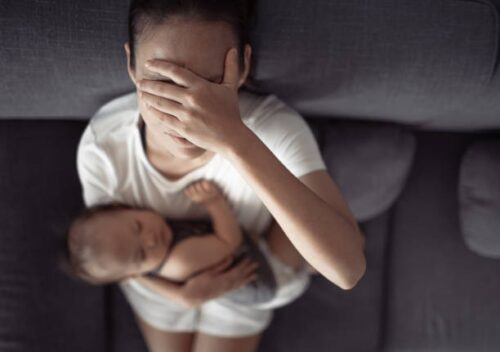The Links Of Postpartum Depression And Diet

Intense emotions can appear with the delivery of a child, ranging from happiness and excitement to dread and anxiety. However, it can also lead to depression, which is something you could fail to anticipate.
The majority of new mothers like you may encounter the “baby blues” after giving birth, which include mood changes, weeping fits, anxiety, and trouble falling asleep. The first two to three days following childbirth are typically when baby blues start, and they can last for two weeks.
However, the higher risk of postpartum depression compared to postnatal depression is a more serious and long-lasting type of depression that affects most new mothers due to its potential to develop during the crucial stage of pregnancy. Postpartum psychosis or an extreme mood condition can occur after childbirth. However, it happens seldom.
Postpartum depression is neither a sign of weakness nor a deficiency in one’s personality. Sometimes, it’s just another birthing issue. Getting assistance and treatment for postpartum depression as soon as possible will help you regulate your signs and symptoms and strengthen your relationship with your child.
Symptoms Of Postpartum Depression
The symptoms of baby blues, often known as postpartum depression, can vary widely in severity. These could consist of a few of the following:
Mood Swings
According to the inclusion criteria of a systematic review and meta expert, severe mood swings, such as depression, can lead to extreme irritation and rage. Feelings of inadequacy, shame, remorse, or worthlessness are constant with the disease. Mood swings may indicate pregnancy early on. During weeks six to ten, when their levels of progesterone and estrogen are quickly rising to support the pregnancy, many pregnant women notice that their moodiness starts.
Anxiety
First-time mothers experience panic episodes and extreme anxiety as well. In certain sad cases, they would frequently become paranoid and desire to keep an eye on their young ones all the time. Because they are afraid that anything could hurt their baby, including the noise, the pillow, or the temperature of the air, most worried mothers would never leave their infant alone. These uncontrollably nervous emotions frequently take over the mother’s thoughts and actions.
Irritability
Common Emotions include frustration, irritation, easily losing your temper, and the need to yell. On the other hand, women who struggle with postpartum period rage and irritability could exaggerate their fears or worry excessively about something always wrong. A feeling of dread, anxious thoughts, and ongoing agitation are among other prevalent symptoms. This experience encourages negative affective states that may or may not be manifested externally, such as displeasure, frustration, and anger.
Feeling Overwhelmed
Sometimes, it is okay, and is expected to feel depressed or stressed. It’s crucial to seek care if a mother experiences intense emotions of depression or anxiety frequently or for a prolonged period. These mothers may be suffering from mental health that they often do not know about, but they constantly feel inside.
Crying
Typically, first-time mothers experience confusion and disorientation when coping with psychological or mental health issues. They frequently refer to this as “crying when they feel like it,” yet the inner pain that follows leads them to cry excessively and occasionally, even for no apparent reason.
Reduced Concentration
Moms with mental illness frequently experience extreme fatigue or lack of energy. There are times that with maternal depression, the sufferer deals with significant association gestational diabetes, vitamin D deficiency, PPD symptoms, a negative dietary pattern, and more. Diminished capacity for focus, clear thinking, or decision-making, and withdrawal from friends and family occasionally. They frequently need help remembering crucial details and appointments and are quickly sidetracked by little things. People’s ability to execute daily tasks and their performance at work or home can be impacted by their inability to concentrate.

Appetite Problems
Moms with mental disorders like PPD may experience a decreased appetite due to medical issues, psychological risk factors such as depression, side effects from medication, or other illnesses. When people have less desire to eat, they have less appetite. Usually, being without hunger is a transient issue. Most moms have this happen when they have a virus that mimics the flu, gastroenteritis, or are under a lot of pressure. Though this increased risk may not be that dangerous, it is significant that mom maintains a healthy eating index, eat food with vitamin D, and always consider nutrient intake.
Trouble sleeping
One of the problems with baby blues is restlessness. Due to your hectic schedule, a first-time mother like you frequently needs more time for relaxation. Working-from-home mothers can feel compelled to maintain their professional relevance and role as nurturing mothers to their newborns. As a result, many assume that they can manage both, for example, their employment and their newborns’ requirements.
When To See A Doctor
You could be hesitant or ashamed to acknowledge that you’re depressed following the birth of your child. However, make an appointment with your physician, gynecologist, or primary care clinician if you exhibit any signs of postpartum depression or the “baby blues.” Seek care right away if you exhibit symptoms that point to postpartum psychosis.
If any of the following characteristics are present in your depressive symptoms, you must see your doctor right away:
-
Continue to feel hopeless even after two weeks
-
Your physical health condition is deteriorating
-
You happen to notice that it’s difficult for you to take care of your child
-
You are having difficulties to finish routine duties
-
You include suicidal thoughts about yourself or your child
Seek quick assistance from your significant other in caring for your child if you have any thoughts of hurting yourself or your child. To need assistance, dial 911 or your local rescue number. Think about other possibilities, such as asking a medical professional for assistance. In addition, you can contact a pastor, spiritual advisor, or another member of your community. You can also call a close friend or family member for immediate response and assistance.
Postpartum And Diet
After giving birth, you must look after yourself. Consuming wholesome meals and getting enough sleep can support your body’s natural healing process and enable you to nurse your baby. Remember, diet has a lot to do with your mental health concerns.
A Balanced Diet
A healthy diet is essential for new mothers. To maintain their health and produce nourishing breast milk, nursing mothers require approximately 500 more calories daily and lots of calcium, protein, and water. Maximizing the benefits of fat sources such as nuts, fish, and vegetable oils is crucial. Limit products that contain substantial fats, such as butter, stick margarine, shortening, and lard.
It’s crucial to check the nutrition information on the food you buy and steer clear of anything heavy in sodium, fat, or trans fats. When paired with moderate activity and a smart eating program, eating well can help you shed a maximum of 20 pounds after giving birth. You could drop even more weight if you choose beverages and food that are low in added sugars.
The human body needs to replenish many vital nutrients even though you’re not “eating for two.” Consult your physician to establish how much is appropriate for you and whether you need to continue taking a dietary supplement or vitamins. Be sure the dietary patterns follow a systematic review that addresses perinatal depression or postpartum depression symptoms. A balanced diet should consist of many fresh fruits and vegetables with omega 3 fatty acids, low-fat dairy goods, foods with high fiber content, and low-fat meats. You should consult the recommendations of the nutritional health care providers for more direction since they offer fantastic details regarding your dietary intake requirements.
Keep Healthy Snacks On Hand
You should consider grabbing fresh fruit and vegetables rather than chips or cookies as part of your energy-boosting snacks. Pick a complex carbohydrate (fruits, fruits and vegetables, whole grain products) and protein (nuts, seeds, yogurt, eggs, milk, cheese, beans, etc.) to provide you with immediate and long-lasting energy that you need daily for your recovery. Consider meals that are easy to digest without much mess or hassle, including wraps, protein balls, and finger meals.
Stay Hydrated
Don’t cut back on your water regimen after having a baby. Drink six to ten glasses of refreshing water daily, whether you are nursing. Fruit juice and milk are also options. Maintaining adequate hydration in the postpartum phase is equally crucial. Drinking extra water when nursing can be necessary. A nursing woman needs approximately sixteen cups of water daily from food, drinks, and drinking water to make up for the additional water needed to produce milk.
Ask Friends To Cook For You
Encourage loved ones to bring you nutritious food when they ask how they can help. You might need more cooking time following your child’s delivery in the first few weeks. With that, you can start taking on more housework after three weeks. But don’t go overboard. Instead, use your network of supporters as much as possible. Pay attention to your body and take a rest if necessary!
Foods to Avoid
Foods that you eat can enter your baby’s system through your milk if you are nursing. Use caution while dealing with:

Alcohol
Regarding how much (if any) alcohol is safe for a newborn and how long to wait before breastfeeding after consuming alcohol, experts disagree. Discuss what’s best for you with your healthcare provider. However, abstaining from alcohol while breastfeeding is the safest option. Drinking alcohol may cause you to produce less breast milk. Alcohol might have an impact on your baby’s sleep and motor development. Additionally, it may lessen the quantity of breast milk your child consumes during feedings.
Caffeine
It is typically safe to consume while nursing your infant, though exact restrictions differ depending on the source. Taking up to 200–300 mg of caffeine daily is often acceptable when nursing. Giving your baby more than three cups (24 oz) of coffee in a day may affect their sleep patterns and temperament, making them agitated. Having said that, if your infant is sensitive to coffee and stops nursing after you do, it may indirectly affect the supply of your nutritional factors.
Helping A Friend Or Loved One
Individuals who are depressed cannot acknowledge or acknowledge their condition. They might not be aware of depression’s warning signs and symptoms. Care a friend or loved one get care as soon as possible if you think they may be suffering from postpartum depression or postpartum psychosis. Don’t hold out and wish for better.



